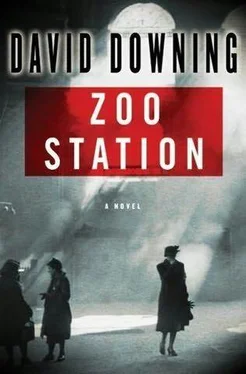David Downing - Zero Station
Здесь есть возможность читать онлайн «David Downing - Zero Station» весь текст электронной книги совершенно бесплатно (целиком полную версию без сокращений). В некоторых случаях можно слушать аудио, скачать через торрент в формате fb2 и присутствует краткое содержание. Жанр: Шпионский детектив, на английском языке. Описание произведения, (предисловие) а так же отзывы посетителей доступны на портале библиотеки ЛибКат.
- Название:Zero Station
- Автор:
- Жанр:
- Год:неизвестен
- ISBN:нет данных
- Рейтинг книги:5 / 5. Голосов: 1
-
Избранное:Добавить в избранное
- Отзывы:
-
Ваша оценка:
- 100
- 1
- 2
- 3
- 4
- 5
Zero Station: краткое содержание, описание и аннотация
Предлагаем к чтению аннотацию, описание, краткое содержание или предисловие (зависит от того, что написал сам автор книги «Zero Station»). Если вы не нашли необходимую информацию о книге — напишите в комментариях, мы постараемся отыскать её.
Zero Station — читать онлайн бесплатно полную книгу (весь текст) целиком
Ниже представлен текст книги, разбитый по страницам. Система сохранения места последней прочитанной страницы, позволяет с удобством читать онлайн бесплатно книгу «Zero Station», без необходимости каждый раз заново искать на чём Вы остановились. Поставьте закладку, и сможете в любой момент перейти на страницу, на которой закончили чтение.
Интервал:
Закладка:
“We could stay with your grandmother.”
“When?”
“A few years yet. When you finish school, maybe.”
Paul’s face fell. “There’ll be a war before then.”
“Who says so?”
Paul looked at him with disbelief. “Everybody does.”
“Sometimes everybody’s wrong.”
“Yes, but…” He blew into his straw, making the Coke bubble and fizz. “Dad,” he began, and stopped.
“What?”
“When you were in the war, did you want to die for England?”
“No, I didn’t.” Russell was suddenly conscious of the people at the tables nearby. This was not a conversation to have in public.
“Did you want to fight at all?”
“Let’s go back up top,” Russell suggested.
“Okay,” Paul agreed, but only after he’d given Russell one of those looks which suggested he should try harder at being a normal father.
They took the elevator once more, and found an empty stretch of rail on the less-popular side, looking away from the city. Down to their left an S-bahn train was pulling out of the Olympic Stadium station.
“I didn’t want to fight,” Russell began, after pausing to marshal his thoughts. “I didn’t volunteer-I was conscripted. I could have refused, and probably gone to prison instead, but I wasn’t certain enough about my feelings to do that. I thought maybe I was just afraid, and that I was hiding behind my opinions. But once I got to the trenches it was different. There were a few idiots who still believed in death and glory, but most of us knew that we’d been conned. All the governments were telling their soldiers that they had God and right on their side, and that dying for their country was the least they could do, but… well, think about it-what does it mean, dying for your country? What exactly is your country? The buildings and the grass and the trees? The people? The way of life? People say you should love your country and be proud of it, and there are usually things to love and be proud of. But there are usually things to dislike as well, and every country has things to be ashamed of. So what does dying for your country achieve? Nothing, as far as I could see. Living for your country, you get the chance to make it better.” He looked at his son, whose expression was almost fierce.
“Our leader says that people who don’t want to fight are cowards.”
“I expect some of them are. But… you remember the Boer War in South Africa, between the English and the Boers? Well, the Indian nationalist leader Gandhi, he was a leader of the Indians in South Africa then, and he refused to fight. Instead he organized medical teams which helped the wounded on the battlefield. He and his people were always in the thick of the action, and lots of them were killed. They wouldn’t fight, but they were about as far from cowards as you can get.”
Paul looked thoughtful.
“But I wouldn’t say anything like that at a Jungvolk meeting,” Russell went on, suddenly conscious of the yearbook he was carrying. “You’d just get yourself in trouble. Think about things, and decide what you think is right, but keep it to yourself, or the family at least. These are dangerous times we’re living in, and a lot of people are frightened of people who don’t think like they do. And frightened people tend to lash out.”
“But if you know something’s wrong, isn’t it cowardly to just keep quiet?”
This was what Russell was afraid of. How could you protect children from the general idiocy without putting them at risk? “It can be,” he said carefully. “But there’s not much point picking a fight if you know you’re bound to lose. Better to wait until you have some chance of winning. The important thing is not to lose sight of what is right and what is wrong. You may not be able to do anything about it at the time, but nothing lasts forever. You’ll get a chance eventually.”
Paul gave him a grown-up look, as if he knew full well that Russell was talking as much about himself as his son.
With time to burn, Russell took the long tram ride back down Ku’damm, spent a couple of hours over dinner in a bar, and then went in search of a movie to watch. The new U-boat drama was showing at the Alhambra, a Zara Leander weepie at the Ufa Palast, and an American Western at the Universum. He chose the latter and reached his seat just as the weekly newsreel was getting started. A rather beautiful piece on Christmas markets in the Rhineland was followed by lots of thunderous marching and a German volleyball triumph in Romania. Suitably uplifted, the audience noisily enjoyed the Western, which almost made up in spectacle what it lacked in every other department.
Effi’s audience had gone home by the time he reached the theater on Nurnbergstrasse, and he only had to wait a few minutes for her to emerge from the dressing rooms. She had forgotten to eat anything between the matinee and evening shows, and was starving. They walked to a new bar on the Ku’damm which one of the new Valkyries had told her served the most incredible omelettes.
They were indeed incredible, but the male clientele, most of whom seemed to be in uniform, left a lot to be desired. Four SS men took a neighboring table soon after their food arrived, and grew increasingly vocal with each round of schnapps. Russell could almost feel their need for a target take shape.
Effi was telling him about Zarah’s latest neurosis-her sister was increasingly worried that her infant son was a slow learner-when the first comments were directed at their table. One of the SS men had noticed Effi’s Jewish looks and loudly remarked on the fact to his companions. He was only about twenty, Russell thought, and when he succeeded in catching the young man’s eye, he had the brief satisfaction of seeing a hint of shame in the way the man quickly looked away.
By this time Effi was rifling through her purse. Finding what she was looking for, and ignoring him, she stood up, advanced on the SS table, and held the fragebogen up to them, rather in the manner of a school-teacher lecturing a bunch of particularly obtuse children. “See this, you morons,” she said, loud enough for the whole bar to hear. “Aryan descent, all the way back to Luther’s time. Satisfied?”
The manager was already at her shoulder. “Fraulein, please…” he began.
“I want these drunken pigs thrown out,” she told him.
The oldest of the SS men was also on his feet. “I would advise you to be careful, fraulein,” he said. “You may not be a Jew, but that doesn’t give you the right to insult members of the Fьhrer’s bodyguard.”
Effi ignored him. “Are you going to throw these pigs out?” she asked the manager.
He looked mortified. “I…”
“Very well. You won’t get any more business from me. Or any of my friends. I hope,” she concluded with one last contemptuous glance at the SS, “that you can make a living selling swill to these pigs.”
She headed for the door, as Russell, half-amused and half-fearful, counted out a few marks for their meal and listened to the SS men argue about whether to arrest her. When one of them took a step toward the door he blocked the way. “You did call her a Jew,” he said mildly, looking straight at the oldest man. “Surely you can understand how upsetting that might be. She meant no disrespect.”
The man gave him a slight bow of the head. “She would do well to control her anger a little better,” he said coldly.
“She would,” Russell agreed. “Have a good evening,” he added, and turned toward the door.
Outside he found Effi shaking with laughter, though whether from humor or hysteria he wasn’t quite sure. He put an arm around her shoulder and waited for the shaking to stop. “Let’s go home.”
“Let’s,” she agreed.
They crossed the busy avenue and headed up one of the side streets.
Читать дальшеИнтервал:
Закладка:
Похожие книги на «Zero Station»
Представляем Вашему вниманию похожие книги на «Zero Station» списком для выбора. Мы отобрали схожую по названию и смыслу литературу в надежде предоставить читателям больше вариантов отыскать новые, интересные, ещё непрочитанные произведения.
Обсуждение, отзывы о книге «Zero Station» и просто собственные мнения читателей. Оставьте ваши комментарии, напишите, что Вы думаете о произведении, его смысле или главных героях. Укажите что конкретно понравилось, а что нет, и почему Вы так считаете.












